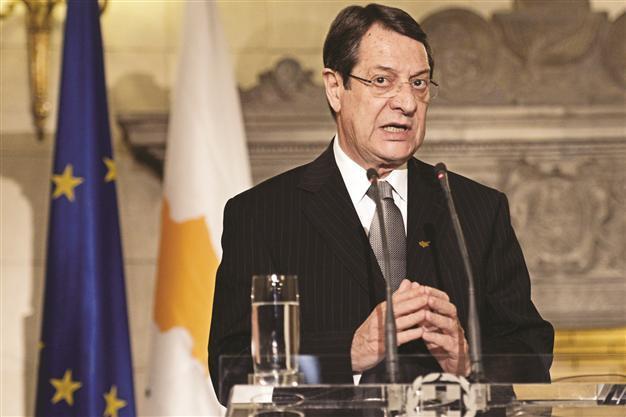Greek Cyprus bailout looms over EU summit
BRUSSELS - Agence France-Presse

Newly-elected Greek Cypriot President Nicos Anastasiades speaks during a press conference after his meeting with the Greek PM in Athens on March 11. AFP photo
European Union leaders meet today and tomorrow with another eurozone debt bailout, this time for Greek Cyprus, looming on the horizon as Europe’s faltering economy and soaring unemployment stoke unease at stinging austerity policies.Dutch Finance Minister Jeroen Dijsselbloem said yesterday that he and his eurozone colleagues would meet after the EU summit on tomorrow to work on a bailout plan for Greek Cyprus - following previous rescues for Greece, Ireland, Portugal, and for Spanish banks.
Greek Cyprus government spokesman Christos Stylianides said just-elected President Nicos Anastasiades hoped “to create a positive climate” at the summit in Brussels. A final deal on a bailout is expected later this month.
There has been much debate over a compulsory reduction, or haircut, on deposits in local banks to cut the overall cost of the rescue but Nicosia says this would be catastrophic, not only for Greek Cyprus but for the entire 17-nation bloc, and the idea seems to be losing ground.
“The situation is difficult but there is no reason for panic,” said Stylianides, adding there would be no haircut and no further cuts in public sector pensions and salaries.
“Patience is required and you will see that hard work brings good results,” Anastasiades said as he left for Brussels.
The mooted 17-billion euro ($22.2 billion) bailout is roughly the same as the island’s annual economic output and would increase debt to more than 140 percent of gross domestic product (GDP), a level considered unsustainable in the long run. EU officials said the 27 EU leaders will discuss Greek Cyprus, taking the opportunity to meet its newly elected president, but not make any decisions at their summit.
Their focus rather will be on finding how to ensure a better balance between the need for austerity and spending more money to generate growth and badly-needed jobs.
A draft of the summit conclusions says that with no growth expected this year and “unacceptably high levels of unemployment”, it is critical to support growth “as a matter of priority.” Member states must continue to make progress on stabilising their strained public finances but this should be done through “growth-friendly fiscal consolidation,” the draft adds.
“Hiding in this language is the idea that you can stretch the time (to meet deficit targets) a bit ... while those in a stronger position can increase expenditure,” an EU official said.
Leaders will try to establish “what growth-friendly fiscal consolidation really means” in practice, the official said.
Another EU official stressed the need to get the balance right, warning: “If there is no growth for 10 years then you can’t pay back your debt so it is a narrow path.” President Francois Hollande notably conceded on March 12 that France would not be able to cut its public deficit to the EU limit of 3.0 percent of gross domestic product this year, coming in instead at 3.7 percent of GDP as a weak economy exacts its toll.
German Finance Minister Wolgang Schaeuble said yesterday he was “sure that France would, like us, respect the rules” on the public deficit, after his ministry announced that the German structural federal budget would be balanced in 2014.
“We have full confidence in France and the European Commission,” Schaeuble said, adding: “We don’t need to give each other mutual advice in public.” Highlighting the difference between the eurozone’s two top economies.
















